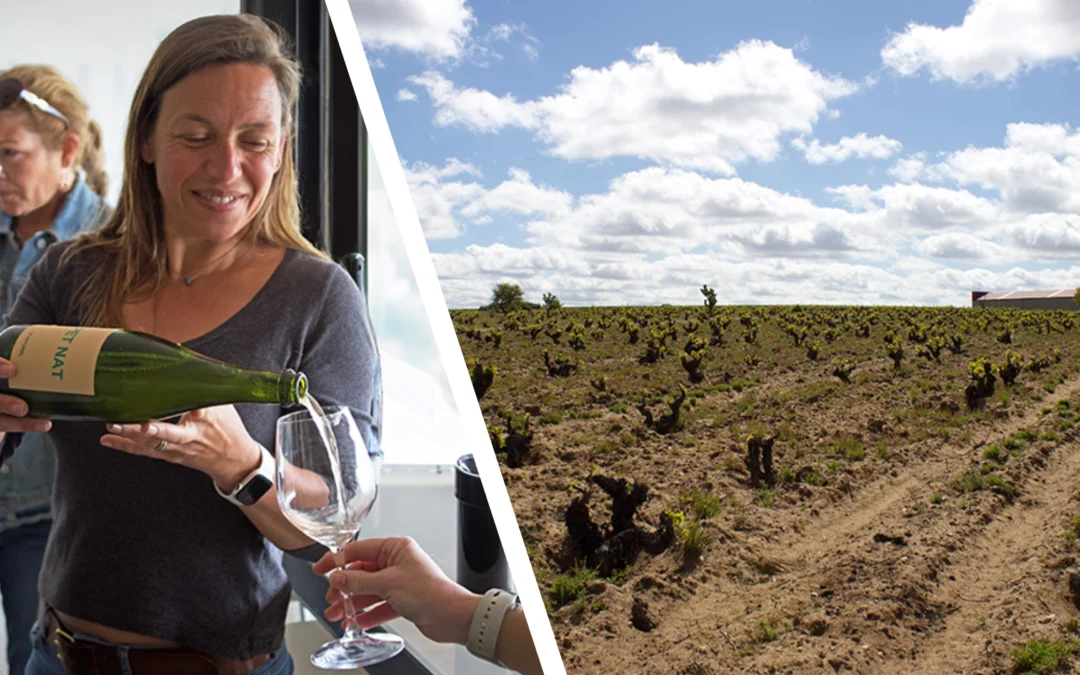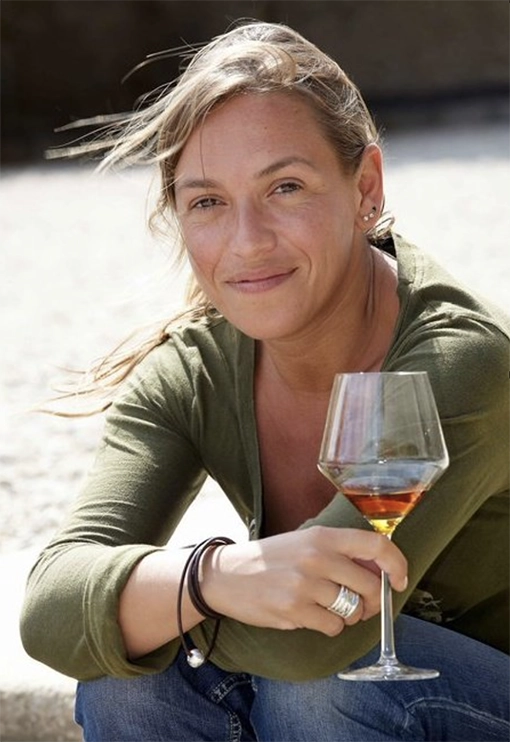In partnership with Serendipity, The WineTones book is currently available in both Texas and California Markets
Marta Plana Mier has spent decades championing Spanish wines in the U.S. market. As founder of The Winetones and U.S. Manager of Vintae, she’s built a career on bridging the gap between Spain’s most dynamic producers and American consumers. One of the few women leading a wine import company, she brings a sharp eye for quality, a deep understanding of international markets, and a relentless drive to elevate Spanish wine. In this interview, Marta shares her journey—from her early days in Penedès to shaping brands for the U.S.—along with the challenges, triumphs, and future of women in wine.
Q: What are your earliest memories of wine and how did it become your passion?
A: I was born and raised in a coastal town in Penedès, a renowned wine region in Catalonia, Spain. Wine—especially Cava—was always a part of my family meals. My father’s passion for traditional cooking shaped my appreciation for how food and wine bring people together. As Mediterraneans, long meals filled with wine, laughter, and conversation are a way of life, creating moments of connection that we deeply cherish. So, I guess the short answer to your question is that my love for wine began at the family table.
Q: What propelled you into the business side of things?
A: After earning my degree in International Trade and Business in Barcelona, a good friend gave me the opportunity to work in the Export Department of a Cava producer he co-owned in the Penedès region. That experience introduced me to the complexities of international wine markets, and I quickly fell in love with the challenge of bringing wines to different countries around the world.
A few years into the industry, I realized that the U.S. represented the biggest challenge—one of the most competitive and dynamic wine markets globally. The complexity of importing, distribution, and marketing fascinated me, and I knew this was the side of the industry where I wanted to grow. I’ll always be grateful for that first opportunity—it opened the door to a career that has allowed me to travel, build meaningful relationships, and, of course, continue enjoying long meals filled with wine and laughter as part of my job.
Q: Where did the name ‘The Winetones’ come from?
A: We wanted to steer away from using my name or any Spanish references for the company. While brainstorming with my husband—my partner in crime and the creative force in the family—we aimed for something catchy that evoked art and beauty. Inspired by the Pantone Matching System, which standardizes colors across industries, we saw a parallel in wine’s own spectrum of shades, from pale golds to deep purples.
This led us to “The Winetones”—a name that felt vibrant, dynamic, and even a bit like a band. Just like music, wine has notes, layers, and harmonies that blend into something beautiful. The name also reflects how wine, like a song, can evoke emotions and transport you to a moment in time.
Q: How does being women-owned influence your approach to wine selection and partnerships?
A: I believe that women have a heightened sensibility, which often makes them exceptional wine tasters and winemakers. Wines crafted by women tend to be beautifully balanced, elegant, and meticulously detailed—qualities I deeply admire.
In the same way, I see these traits reflected in how I run my business. I approach partnerships with trust, care, and consistency, valuing long-term relationships built on mutual respect and shared passion. Just as great winemaking requires patience and precision, I believe that fostering strong, meaningful connections in the industry is key to long-term success.
Bodegas Aroa is leading the way in introducing organic viticulture to Navarra, with their Zero Zero NA and Le Naturel labels.
Q: What trends are you seeing in wine right now, and how are women playing a role in shaping the future of the industry?
A: One major trend is the growing demand for organic, biodynamic, and low-intervention wines, along with the rapid rise of the non-alcoholic (N/A) category. Consumers are drinking less but better, prioritizing sustainability, authenticity, and transparency. As more women take leadership roles across the wine industry—winemaking, importing, and marketing—I believe we’ll see even more high-quality wines crafted with thoughtfulness and intention.
Q: What wines from your book are you most excited about right now and why?
A: Lately, I’ve been particularly excited about lighter reds—wines that are chillable, lower in alcohol, and beautifully balanced with bright acidity. I love how these wines are versatile enough to be enjoyed on their own yet also pair effortlessly with food.
At the same time, I’m really excited about the new white wines I’ve added to the portfolio. Spain has an incredible range of white wines that are still largely undiscovered in the U.S., and I’m enjoying exploring and sharing them. There’s so much depth, character, and freshness in these wines, and I can’t wait for more people to experience them.
Q: Are there other women in the wine industry that you feel particularly inspired by at the moment?
A: Thankfully, I have a long list of inspiring women in the industry today. When I first started more than 20 years ago, women were nearly absent – especially in export departments, where extensive travel was required. It was a male-dominated space, and breaking in as a woman often meant working twice as hard for the same recognition.
Today, I’m fortunate to know and admire many remarkable women – friends, colleagues, and pioneers who continue to inspire me every day. These are women who have fought tirelessly to carve out their place, demonstrating their expertise and passion in an industry that hasn’t always welcomed them.
Q: Have you faced any unique challenges as a woman in the wine import business? How did you overcome them?
A: Like many women in the industry, I’ve encountered moments where my expertise was questioned or my presence in a room was underestimated. The wine business has historically been male-dominated, but I’ve found that persistence, knowledge, and strong relationships are key to overcoming these challenges. Surrounding myself with a network of supportive colleagues—both women and men—has also been instrumental in navigating the industry.
Q: What advice would you give to other women looking to break into wine importing or the wine business in general?
A: Don’t be afraid to take up space and make your voice heard. Build your expertise by tasting, studying, and traveling whenever possible. Seek mentors, but also create your own opportunities. The wine industry thrives on relationships, so invest in authentic connections, and always stay open to learning.
Q: For Women’s History Month, what message would you like to share with wine lovers about supporting women-owned businesses in the industry?
A: Every bottle has a story, and many incredible wines are made, crafted, imported, and sold by women. Supporting women-owned businesses means advocating for diversity, creativity, and innovation in the industry. This Women’s History Month, I encourage wine lovers to seek out female-led wineries, importers, and retailers. Your purchasing choices can help shape a more inclusive and dynamic wine world.
Marta Plana Mier’s journey is a testament to the power of vision, perseverance, and a deep love for wine. Through The Winetones and Vintae, she continues to shape the presence of Spanish wines in the U.S., forging connections between producers and consumers while championing innovation in a traditionally rigid industry. As one of the few women at the helm of a wine import company, she’s not only opening doors for Spanish winemakers but also paving the way for more women to lead in the world of wine. With her keen eye for quality and unwavering dedication, Marta is proving that the future of wine is global, diverse, and full of possibility. Check out her exquisite selections, which range from the harrowing mountains of Monstant to the tenacious wines of Toro, below:





